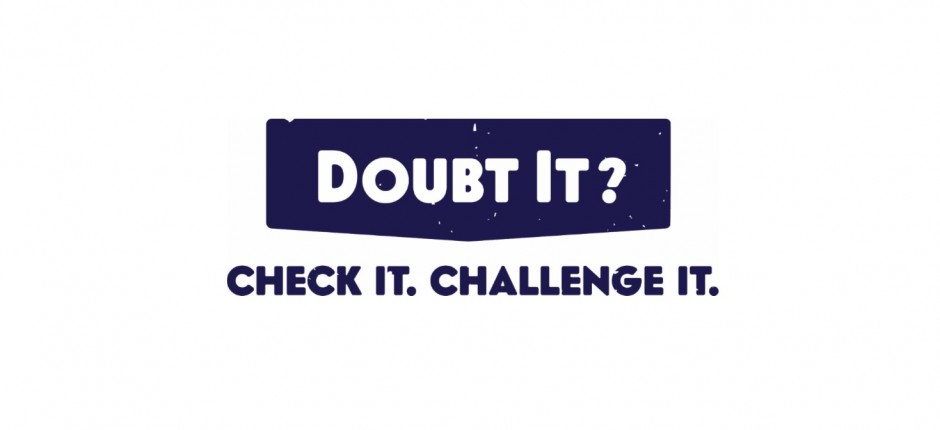The Canadian Journalism Foundation arms Canadians with tools to counter misinformation
You don’t need to be a journalist to fight fake news. Doubt it? Check it. Challenge it.
TORONTO, Oct. 2, 2019 – The Canadian Journalism Foundation (CJF) launches its Doubt It? campaign today to give Canadians the skills and tools to combat fake news and misinformation. Its goal is simple: teach Canadians to understand the difference between fact-based journalism and fake news in our digital and social media-driven world.
Doubt It? uses humour, actionable advice and collaborations with respected Canadian media personalities to remind people of three simple steps anyone can take to put their inner skeptic to work: Doubt it? Check it. Challenge it.
“We are using humour for this very serious topic to encourage people to engage, share and ultimately fight back against fake news and misinformation,” said Natalie Turvey, President and Executive Director of the CJF. “We want Canadians to be savvy when it comes to the information they consume. Be skeptical – if you doubt it, then check it, then challenge it and call it out. The CJF believes that everyone needs access to reliable sources of news and information to be engaged in our democracy.”
Doubt It? builds on the CJF’s earlier partnership with CIVIX on NewsWise, a news literacy program to provide school-aged Canadians an understanding of the role of journalism in a healthy democracy and the tools to find and filter information online. NewsWise is supported by a grant from Google.org.
The campaign includes a website (https://doubtit.ca/) with useful tips, links to third-party fact-checking sites, videos explaining simple fact-checking techniques, and a fun fake news quiz that puts visitors’ new skills to the test. It will be promoted with a digital ad campaign as well as public service announcements from CTV National News anchor Lisa LaFlamme, co-host of The Morning Show on Global News Radio 640 Toronto Supriya Dwivedi, YouTube stars Michell Moffit and Gregory Brown behind the wildly popular YouTube channel AsapSCIENCE, and retired CBC News chief correspondent and anchor Peter Mansbridge. By taking a tongue-in-cheek approach, the CJF believes the valuable message will connect with more Canadians. A French-language campaign will be launched in the coming weeks.
“Now more than ever, people are getting their news from online sources and social media,” said Turvey. “Access to unprecedented amounts of information means Canadians must continually sort and assess what we see.”
The Doubt It? campaign will educate the Canadian public about the prominence of fake news and how to fact-check. According to data collected by The Canadian Journalism Foundation, with research conducted by Earnscliffe Strategy Group, as well as research conducted by Ipsos Public Affairs for the Centre for International Governance Innovation and MIT researchers:
– 90% of Canadians admit to falling for fake news, and to make matters worse:
– Fake news stories spread six times faster than the truth. – Only 33% of Canadians regularly try to confirm if the news we see is real. – 40% of Canadians report finding it difficult to distinguish between truth and misinformation in the news. – More than half of respondents (53%) have come across stories recently where they believe facts were twisted to push an agenda.
Test your fake news spotting skills with this online quiz created for the Doubt It? campaign: https://doubtit.ca/test-yourself/
#DoubtIt




